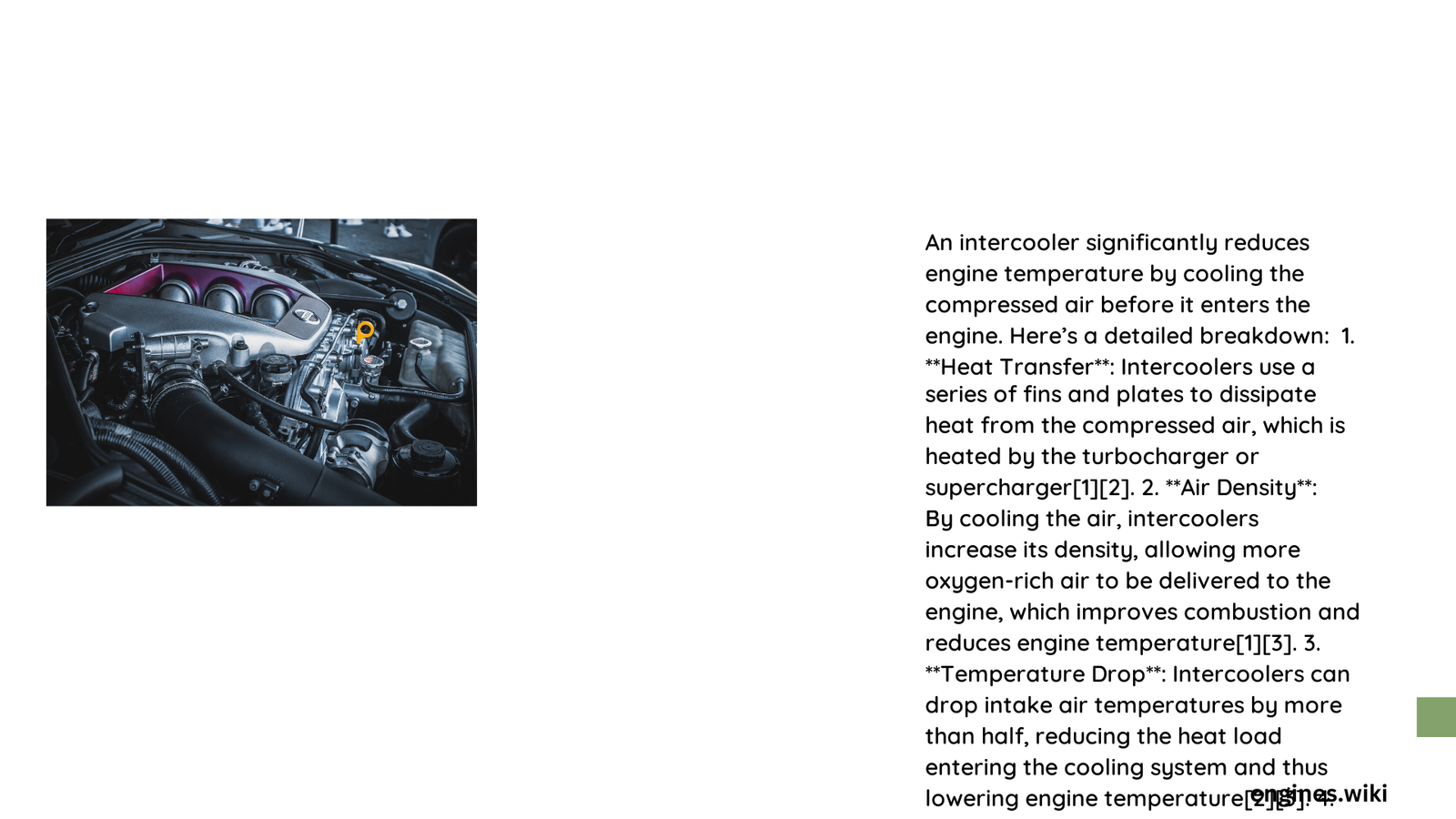An intercooler is a critical thermal management component in turbocharged and supercharged engines that dramatically reduces intake air temperature by cooling compressed air before it enters the engine. By efficiently transferring heat from compressed air to a cooler medium, intercoolers can lower intake temperatures by up to 300-400 degrees Fahrenheit, preventing engine knock, improving power output, and reducing thermal stress on critical engine components.
What Is an Intercooler and How Does It Work?
Intercoolers are heat exchangers designed to cool compressed air generated by turbochargers or superchargers before it enters the engine’s intake manifold. The primary function of an intercooler is to reduce the temperature of compressed air, which becomes significantly heated during the compression process.
How Do Intercoolers Reduce Engine Temperature?
Intercoolers reduce engine temperature through several key mechanisms:
- Heat Transfer Process
- Compressed air passes through intricate tube and fin configurations
- Heat is transferred from hot compressed air to cooler ambient air
-
Temperature reduction occurs through convection and conduction principles
-
Temperature Reduction Metrics
- Air-to-Air Intercoolers: Temperature drop from 500°F to 100-150°F
- Air-to-Water Intercoolers: Temperature reduction to 60-70°F
- Potential temperature drop can exceed 300-400 degrees Fahrenheit
What Are the Types of Intercoolers?
| Intercooler Type | Temperature Reduction | Efficiency | Typical Application |
|---|---|---|---|
| Air-to-Air | 300-400°F | Moderate | Passenger Vehicles |
| Air-to-Water | 400-450°F | High | Performance/Racing |
| Liquid-to-Air | 450-500°F | Very High | Heavy-Duty Vehicles |
Why Does Compressed Air Temperature Matter?

Compressed air temperature significantly impacts engine performance:
- Higher temperatures reduce air density
- Decreased oxygen content limits combustion efficiency
- Increased risk of engine knock and detonation
- Potential for premature engine wear
What Performance Benefits Can You Expect?
Intercoolers provide multiple performance advantages:
- Increased horsepower and torque
- Improved combustion efficiency
- Reduced exhaust gas temperatures
- Enhanced engine reliability
- Prevention of thermal-related engine damage
Technical Considerations for Intercooler Effectiveness
How Do Ambient Conditions Impact Intercooler Performance?
Intercooler efficiency depends on several environmental factors:
- Ambient air temperature
- Humidity levels
- Airflow characteristics
- Intercooler core design
- Pressure drop across the system
What Challenges Do Intercoolers Face?
- Managing extreme temperature variations
- Minimizing pressure drop
- Maintaining optimal heat transfer efficiency
- Handling different boost pressures
- Adapting to various driving conditions
Conclusion: Intercoolers as Critical Thermal Management Solutions
Intercoolers are not just optional performance upgrades but essential components in modern turbocharged engines. By effectively reducing intake air temperatures, they play a crucial role in maintaining engine health, improving performance, and preventing potential thermal-related failures.
Key Takeaways
- Intercoolers can reduce intake air temperatures by 300-400°F
- They improve overall engine efficiency and performance
- Different designs suit various automotive applications
- Proper selection and installation are critical for optimal results
Reference:
– Garrett Motion Intercooler Technology
– Mishimoto Intercooler Guide
– Banks Power Thermal Management
